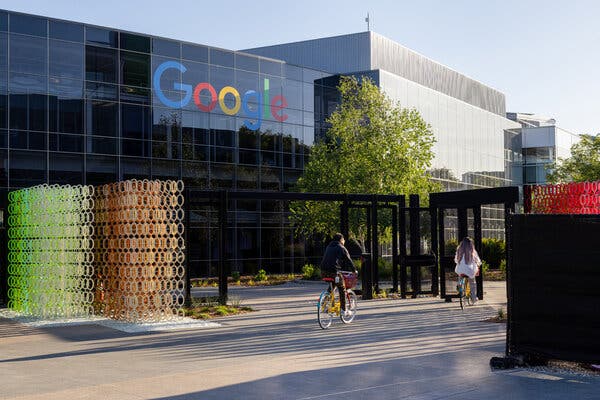Will The U.S. Successfully Break Up Google's Advertising Monopoly?

Table of Contents
Google's Market Power: A Colossus in the Advertising World
Google's position in the advertising world is, to put it mildly, colossal. Its market share across various advertising segments is breathtaking, leading to concerns about its monopolistic practices and the potential stifling of competition.
Market Share Domination
Google's grip on the online advertising market is undeniable. Reports indicate it commands well over 50% of the search advertising market, a significant portion of the display advertising market, and a substantial share of the rapidly growing programmatic advertising sector. These figures translate into billions of dollars in annual revenue, solidifying its position as a behemoth in the industry. This dominance raises serious questions about fair competition and market access for smaller players.
Bundling and Integration
Google's dominance is further amplified by its strategic bundling and integration of various advertising products.
- Search Ads: Google tightly integrates its search advertising platform with its search engine, giving its own ads a significant advantage in visibility and placement.
- Display Ads: Google's display ads, served across its vast network of websites and apps, benefit from the massive reach and targeting capabilities of its data infrastructure.
- YouTube Ads: The integration of ads within YouTube, a globally dominant video platform, provides another lucrative avenue for Google's advertising revenue, further solidifying its market control.
- Android Integration: Google's ownership of Android, the world's most popular mobile operating system, allows for deep integration of its advertising technologies, creating a near-insurmountable barrier for competitors.
This intricate web of interconnected services creates a powerful ecosystem that is difficult for competitors to penetrate.
Data Advantage
Google's unparalleled access to user data is perhaps its most significant competitive advantage. Its vast data collection across various services – Search, Gmail, Android, YouTube – allows for highly targeted and personalized advertising.
- Search Queries: Google collects billions of search queries daily, providing invaluable insights into user intent and preferences.
- Location Data: Google Maps and other location-based services provide detailed geographic data, enabling hyperlocal advertising.
- Demographic Data: Google's user profiles encompass demographic information, interests, and browsing history, enabling highly refined targeting.
- Behavioral Data: Google tracks user behavior across its ecosystem, allowing it to predict future needs and deliver highly relevant ads.
This sophisticated data advantage allows Google to create highly effective ad campaigns with unparalleled efficiency, leaving competitors struggling to keep up.
Antitrust Investigations and Legal Challenges
Google's dominance has not gone unnoticed. Several significant antitrust investigations and legal challenges are underway, aiming to curb its power.
Department of Justice (DOJ) and State Attorneys General Actions
The Department of Justice (DOJ) and multiple state attorneys general have filed lawsuits against Google, alleging anti-competitive practices. These lawsuits focus on various aspects of Google's business, including:
- Monopolization of the search advertising market: Accusations center on Google’s use of its dominant search engine to favor its own advertising products over competitors.
- Leveraging market power: The DOJ and state AGs argue that Google has used its market power in one area (search) to gain an unfair advantage in other markets (advertising).
- Stifling competition: Claims allege Google has engaged in practices to actively suppress competition and limit the growth of rival ad platforms.
Key Arguments Against Google
The core argument against Google centers on its alleged abuse of its dominant position to stifle competition and harm consumers. The plaintiffs contend that Google's actions have resulted in higher advertising costs for businesses and less choice for consumers.
Google's Defenses
Google maintains that its success is due to innovation and superior products, and that its practices are pro-competitive. The company argues that it operates in a highly competitive market with numerous rivals and that its services benefit consumers through lower prices and greater choice. However, the evidence presented by the DOJ and state AGs paints a different picture.
Potential Outcomes and Their Implications
The legal battles facing Google could result in several different outcomes, each with significant implications for the advertising industry and the broader tech landscape.
Scenario 1: Successful Breakup
A successful breakup of Google could lead to a more fragmented advertising market, potentially fostering greater competition and innovation.
- Positive Consequences: Increased competition could lead to lower advertising costs for businesses and more choices for consumers. New entrants could emerge, offering fresh perspectives and technologies.
- Negative Consequences: A breakup could also lead to disruption and uncertainty in the market, potentially impacting the efficiency and effectiveness of online advertising. It might also create regulatory challenges in managing the newly separated entities.
Scenario 2: Regulatory Changes and Fines
A less drastic outcome might involve imposing stricter regulations on Google's advertising practices or levying substantial fines without a complete breakup. This approach aims to curb anti-competitive behavior without the upheaval of a full-scale dismantling. The impact would likely be less dramatic than a complete breakup but would still significantly alter Google's operations and its market power.
Scenario 3: Status Quo
If the legal challenges fail, Google will likely maintain its dominant position in the advertising market. This outcome would perpetuate existing concerns about the lack of competition and potential consumer harm. The status quo would likely lead to continued consolidation of power within the advertising industry, potentially stifling innovation and limiting consumer choice.
Conclusion: The Future of Google's Advertising Monopoly - A Verdict Still Unwritten
The question of whether the U.S. will successfully break up Google's advertising monopoly remains unanswered. The arguments for a breakup center on concerns about anti-competitive practices, stifling innovation, and harm to consumers. Conversely, Google argues its success stems from merit and its services benefit users. The various potential outcomes—breakup, regulatory changes, or the status quo—each carry significant implications for the future of online advertising. The legal battles are ongoing, and the final verdict will shape the digital landscape for years to come. Stay updated on the developments surrounding Google's advertising monopoly to understand the future of online advertising competition. Follow the legal proceedings to understand the future of online advertising competition and learn more about the fight to break Google's advertising monopoly.

Featured Posts
-
 Canelo Alvarez Undercard Bakole And Ajagba To Clash In Heavyweight Fight
May 04, 2025
Canelo Alvarez Undercard Bakole And Ajagba To Clash In Heavyweight Fight
May 04, 2025 -
 1 50
May 04, 2025
1 50
May 04, 2025 -
 Myke Wright Lizzos Partner Career Net Worth And Relationship Insights
May 04, 2025
Myke Wright Lizzos Partner Career Net Worth And Relationship Insights
May 04, 2025 -
 New Baby For Max Verstappen Name Revealed
May 04, 2025
New Baby For Max Verstappen Name Revealed
May 04, 2025 -
 Ufc On Espn 67 A Complete Guide To The Sandhagen Vs Figueiredo Event Results
May 04, 2025
Ufc On Espn 67 A Complete Guide To The Sandhagen Vs Figueiredo Event Results
May 04, 2025
